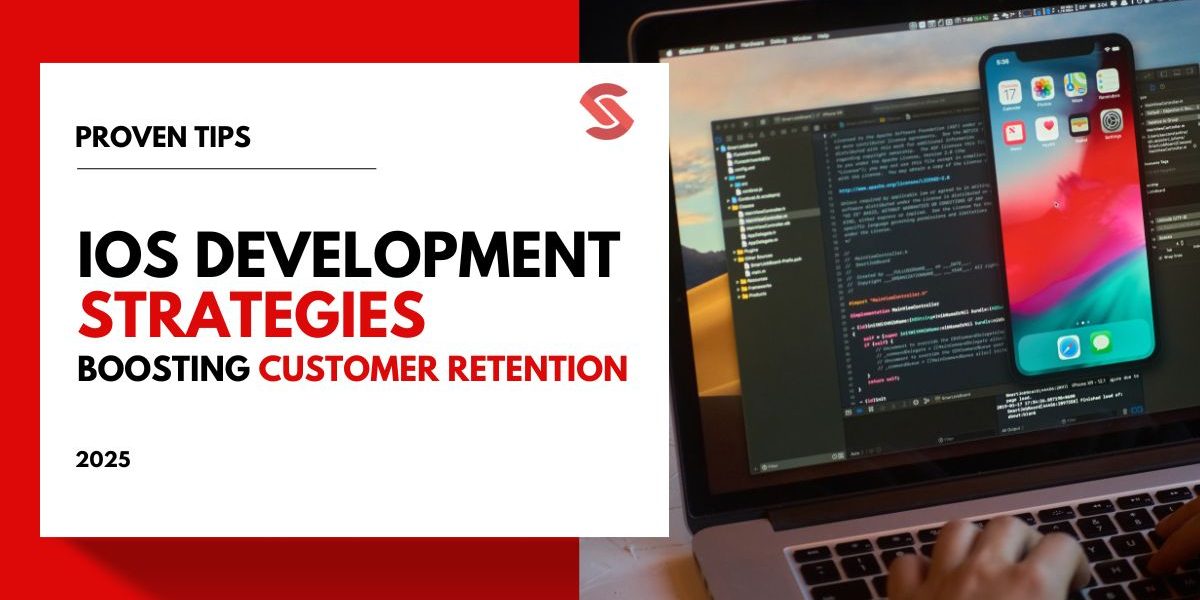As greats of the tech industry often say “Opportunities don’t happen, you create them,” and for startups, developing a mobile app is one of the best ways to create opportunities. An app is a platform to engage customers, build loyalty, and drive growth. To succeed, it must use Android’s unique advantages to deliver value and stand out.
A report by Sensor Tower reveals that consumer spending on Google Play surpassed $50 billion in 2023, Android offers entrepreneurs a major opportunity to monetize their apps, thanks to its high earning potential and vast global reach. For startups, it’s a platform that opens doors to lucrative markets and diverse audiences.
In this blog, we will share the key benefits of Android app development that can boost startups toward success in 2025.
Why Android App Development is a Smart Choice for Startups
Android’s popularity and growth make it a great platform for startups aiming to reach a wide range of users. With a large global user base and support for diverse devices, Android provides startups the flexibility to build Android apps for business growth that can connect with audiences across different regions and needs.
Its open-source nature helps reduce development costs, which is especially important for businesses just starting. Android’s ability to adapt to various market demands and its accessibility allow startups to innovate and grow while reaching more people effectively.
Key Benefits of Android App Development for Startups
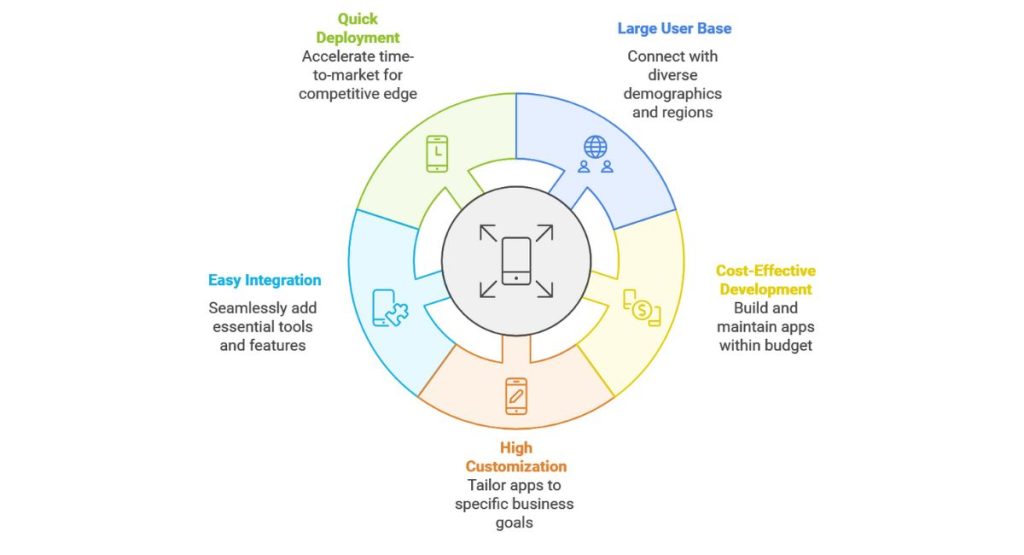
For startups looking to make an impact, Android app development offers the perfect foundation for growth and success. With its wide reach, Android helps startups connect with users globally. Its cost-effective tools and flexible features enable customized solutions within budget.
Android also supports fast deployment, helping startups get their ideas to market quickly. Its compatibility with multiple platforms, open-source tools, and monetization options provides a bunch of opportunities to innovate, scale, and thrive.
1. Large User Base and Market Reach
Android’s large and diverse user base makes it an ideal platform for startups aiming to grow their audience. Its compatibility with a wide range of devices, from budget-friendly options to premium smartphones, ensures startups can connect with users across different demographics and regions. This cross-market reach is a significant advantage for businesses looking to scale quickly.
Pros of Android’s Large User Base and Market Reach:
- Device Variety: Compatible with affordable and premium devices alike.
- Global Accessibility: Reach users in various regions, including emerging markets.
- Audience Diversity: Engage users from different age groups, lifestyles, and income levels.
- Cross-Market Reach: Expand into multiple geographic and economic markets effortlessly.
2. Cost-Effective Development and Maintenance
For startups working with limited budgets, Android’s open-source nature and affordable tools provide an excellent opportunity to build and maintain apps without overspending. Its extensive developer community also offers free resources and support, further reducing costs and accelerating the development process.
Working with free libraries, resources, and frameworks startups can significantly lower their application development cost while creating feature-rich solutions. Android apps are easy to maintain and scale, allowing startups to focus their resources on growth and innovation while keeping expenses low.
3. High Customization Potential
Startups can benefit greatly from the platform’s flexibility, allowing them to design apps tailored to their specific goals. This flexibility plays a vital role in driving business growth with custom apps, enabling businesses to create a branded user interface or incorporate unique features that align with their vision.
The ability to personalize ensures the app reflects the business’s identity and meets its unique needs. This customization not only enhances user experience but also helps businesses stand out by delivering apps that truly resonate with their target audience. From functionality to design, startups have the freedom to craft exactly what they envision.
4. Easy App Integration and Compatibility
The platform’s ease of integration makes it a top choice for startups wanting to add essential tools and features effortlessly. Startups can connect their apps with third-party services like payment gateways, analytics, or marketing tools without hassle.
Its compatibility across a wide variety of devices and systems ensures a consistent and smooth experience for users. This adaptability simplifies app development and allows businesses to focus on growth while ensuring their apps are scalable and future-ready.
5. Quick Deployment and Time-to-Market
For startups looking to gain a competitive edge, the ability to launch an app quickly can make all the difference. As Eric Ries, author of The Lean Startup, says, “Speed is a key driver of innovation. The faster you launch, the faster you learn.”
Android’s flexible development framework and straightforward publishing process empower startups to bring their ideas to life faster. The platform also supports rapid updates, allowing businesses to refine their apps post-launch and adapt quickly to market demands, ensuring they stay ahead of competitors.
Android Features and Trends Beneficial for Startups in 2025

We all have heard that “The early bird catches the worm,” and for startups, staying ahead means adapting the latest features and trends. In 2025, Android is set to empower startups with AI-powered personalization, advanced security tools, and seamless cross-device integration.
Features like 5G optimization, instant apps, and AR/VR capabilities will improve user experiences. With low-code tools accelerating development and sustainability-focused features aligning with user values, Android offers startups the tools they need to innovate and grow.
1. AI and Machine Learning Capabilities
Android’s AI and machine learning capabilities open doors for startups to create innovative and impactful apps. These features enable businesses to deliver personalized user experiences, smart recommendations, and predictive analytics.
For example, a report by McKinsey shows that companies using AI see a 20% increase in customer engagement due to better personalization. Using AI-powered tools, startups can analyze user behavior, predict needs, and adapt in real time, creating apps that feel intuitive, dynamic, and aligned with user expectations.
2. Enhanced Security Features for Data Protection
Building user trust is essential for startups, and Android’s advanced security features make this achievable. For businesses focused on creating secure enterprise apps, tools like data encryption, secure access controls, and strong privacy settings ensure user information is well-protected.
These features help businesses meet user expectations and comply with data protection regulations. By prioritizing security, startups not only safeguard sensitive data but also build confidence among users, a critical factor in creating lasting relationships and a loyal customer base.
3. Offline Mode and Data Syncing
Startups can greatly enhance user experience by offering offline functionality in their Android apps. Offline mode ensures that users can access essential features even without an internet connection, making apps more reliable and convenient.
With data syncing, updates made offline are automatically synchronized once connectivity is restored. This combination improves user retention, especially for apps catering to regions with inconsistent internet access, ensuring that users can rely on the app whenever they need it.
4. Support for IoT and Wearable Technology
Android’s compatibility with IoT devices and wearables allows startups to enter the growing market of connected technologies. From smartwatches to home automation systems, Android’s integration capabilities help businesses create apps that cater to modern user demands. Startups can tap into new markets by developing solutions that enhance convenience, connectivity, and innovation.
Benefits of IoT and Wearable Technology Support:
- Wearable Compatibility: Create seamless experiences for devices like smartwatches.
- Connected Devices: Develop apps for smart homes, healthcare devices, and more.
- Smart Tech Integration: Build innovative solutions for enhanced user engagement.
- Emerging Market Access: Tap into growing demand for smart technologies.
Development Tools and Resources for Android Startups
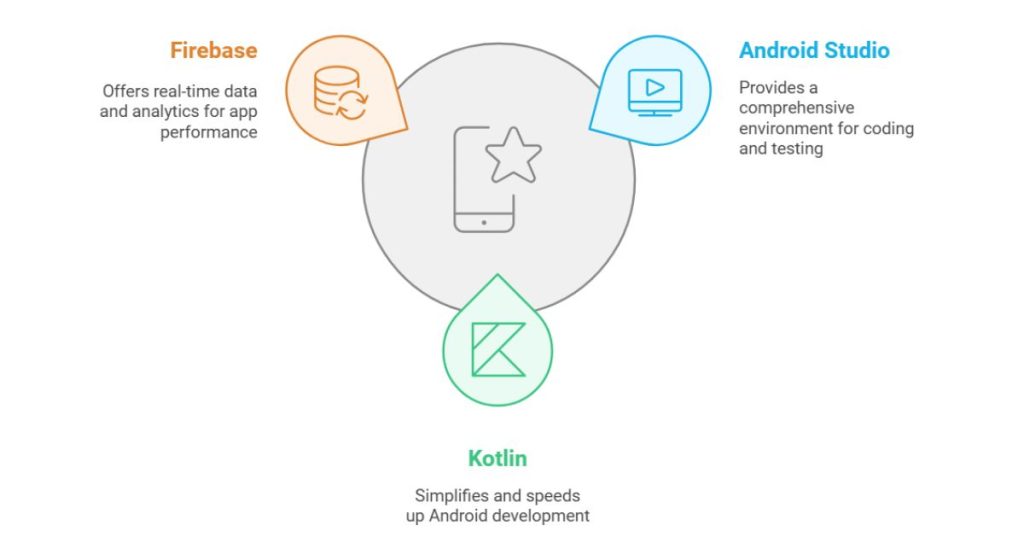
Creating a successful app begins with leveraging the right tools, and Android provides a secure set of resources to help startups thrive. From Android Studio for efficient coding to open-source libraries that save development time, these resources simplify the process.
Tools like Firebase provide backend support, while Material Design guidelines ensure smooth UI/UX. Testing frameworks, cloud hosting, and analytics platforms help optimize performance and scalability, making it easier for startups to create apps that stand out and grow effectively.
1. Android Studio and Development Libraries
Android Studio, the official Integrated Development Environment (IDE) for Android, is a powerful tool that simplifies app development services for startups. It provides everything developers need, from code editing and debugging to testing tools, all in one place.
With access to pre-built libraries and the Android SDK, startups can quickly add features without building everything from scratch. This efficiency allows developers to focus on creating robust, innovative apps while saving time and reducing development complexity.
2. Kotlin: A Language Built for Android Development
Kotlin has become a favorite for Android developers thanks to its simplicity and efficiency. Designed to work seamlessly with Android, Kotlin reduces boilerplate code, making development faster and cleaner.
It also improves app performance and reliability while offering excellent community support for troubleshooting and guidance. For startups, Kotlin’s Android-first approach means smoother coding, fewer bugs, and the ability to create apps that perform well while staying easy to maintain and scale.
3. Firebase for Real-Time Data and Analytics
As Clive Humby, a famous Data Scientist said “Firebase data is the new oil for startups, it fuels growth and innovation.” is a game-changer for startups looking to enhance app performance and make informed decisions. It offers real-time data tracking, powerful analytics, and user engagement insights.
This allows startups to understand how their apps are performing and what their users need.
Features like performance monitoring and crash reporting help identify and resolve issues quickly. With Firebase, startups can create data-driven strategies to improve their apps and keep users engaged.
Marketing and Monetization Advantages of Android for Startups
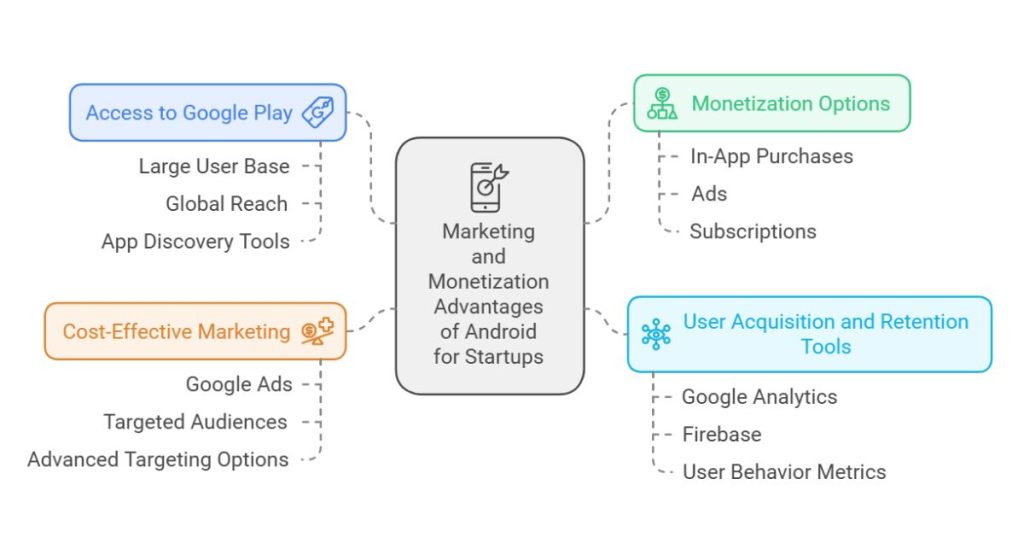
For startups aiming to grow, Android offers powerful tools to market apps and generate revenue effectively. Its vast global audience, especially in emerging markets, makes it easier to reach diverse users.
Cost-effective marketing like ASO boosts visibility, while monetization models like ads, subscriptions, and in-app purchases drive earnings. Tools like AdMob and Firebase Analytics provide insights, and Android’s open ecosystem allows for localization, cross-promotion, and tailored user experiences to enhance engagement and revenue.
1. Access to Google Play’s Large User Base
The Google Play Store gives startups access to millions of potential users across the globe, making it a powerful platform for app exposure. With its reach in both developed and emerging markets, startups can connect with diverse audiences and grow their customer base. Google Play’s tools for app discovery also help improve visibility, increasing the chances of downloads and engagement.
How Google Play’s Large User Base Helps Your Startup:
- Diverse Audience: Connect with users across multiple markets.
- Wide Device Support: Reach users on various Android devices.
- Global Reach: Access users from various regions and demographics.
- High Visibility: Boosts app discoverability through built-in recommendations.
2. Multiple Monetization Options
Android provides startups with several monetization methods to generate revenue and sustain growth. Whether through in-app purchases, ads, or subscriptions, startups can choose models that suit their app’s goals and target audience.
In-app purchases allow users to buy features or content, ads generate income through impressions and clicks, and subscriptions create steady recurring revenue. This flexibility enables startups to maximize earnings while offering value to users.
3. Data-Driven User Acquisition and Retention Tools
Tools like Google Analytics and Firebase empower startups with data-driven insights to improve user acquisition and retention strategies. These platforms provide valuable metrics, such as user behavior, engagement trends, and retention rates, helping businesses understand what works and what needs improvement.
According to Statista, mobile app user retention rates vary significantly by category, with news apps achieving over 9% retention after 30 days, while education apps retain less than 2% of users in the same period. Working with these analytics tools, startups can develop more effective campaigns, personalize user experiences, and foster long-term engagement
4. Cost-Effective App Marketing on Google Ads
Google Ads offers startups an affordable way to promote apps and reach targeted audiences on Android devices. Its advanced targeting options ensure startups can connect with the right users based on interests, demographics, or behaviors.
Startups can control their budgets, adjust campaigns easily, and monitor performance in real time. This makes Google Ads a smart choice for driving app downloads and increasing visibility without overspending, helping startups compete effectively in the app market.
Future-Proofing Android Apps for Startup Success
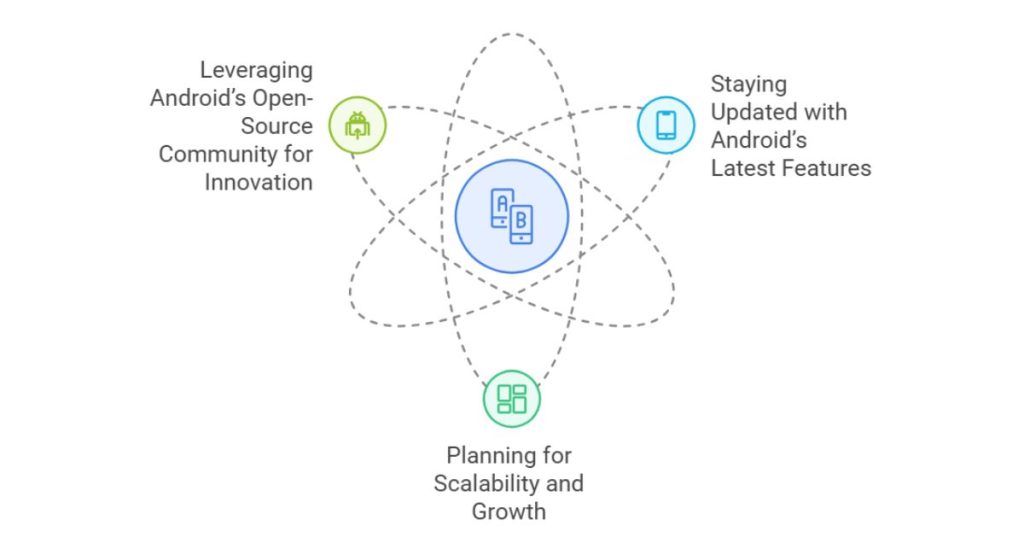
The best way to predict the future is to create it, and startups must design their Android apps with growth and innovation in mind. Future-proofing means building apps that scale effortlessly, integrate with emerging technologies like IoT and AI, and maintain performance across devices.
With modular architecture, cloud solutions, and regular updates, startups can stay ahead of the curve. Prioritizing security, compliance, and user feedback ensures apps remain reliable and adaptable as the market evolves.
1. Staying Updated with Android’s Latest Features
Keeping up with Android’s latest updates and features is crucial for startups to stay competitive and deliver exceptional user experiences. Regular updates not only enhance performance and compatibility but also bring new tools that improve functionality and user engagement.
As Sundar Pichai once said, “Innovation happens when you step out of your comfort zone.” Adopting Android’s advancements early, startups can innovate faster and maintain an edge in a rapidly evolving market.
2. Planning for Scalability and Growth
Startups must plan every essential thing before and planning for scalability ensures that your app can handle future growth, new features, and a growing user base. Building a flexible architecture from the start saves resources and avoids performance issues later.
Cons of Not Planning for Scalability:
- Performance Issues: Apps may crash or slow down with increased traffic.
- User Drop-Off: Poor performance can frustrate users, leading to uninstalls.
- Higher Costs: Retrofitting scalability into an existing app is expensive and time-consuming.
- Missed Opportunities: Limited capacity may prevent startups from capturing larger markets.
Without scalability, startups risk facing bottlenecks and losing users as they grow. Scalable apps are better equipped for growth and ensure that your business can adapt to future demands easily.
3. Leveraging Android’s Open-Source Community for Innovation
Android’s open-source community provides startups with a wealth of resources, tools, and opportunities for collaboration. Startups can not only access pre-built libraries, frameworks, and code snippets from the community but also follow the latest mobile app development trends, to accelerate development and cut costs.
Open-source platforms also encourage collaboration, where developers share innovative ideas and solutions. This community helps startups stay ahead of trends, explore new technologies, and create unique features efficiently, fostering innovation from the ground up.
Conclusion
Choosing Android gives startups the flexibility, cost-effectiveness, and global reach to build scalable, impactful apps. Its open-source nature and developer-friendly ecosystem foster innovation and smooth development, making it a smart choice for growth.
With Android, startups can easily integrate advanced features, expand into emerging markets, and connect with diverse audiences. It’s a platform built to support businesses at every stage, empowering them to stand out and succeed.
If you’re looking for reliable Android app development services, Softnix is the name you can trust. Our team blends expertise with a strategic approach to create apps that align with your business needs. We focus on delivering high-quality, user-friendly apps that drive growth and engagement for startups.
Get in touch with us today to start your journey toward success!
FAQs about the Benefits of Android Apps for Startups
1. Why should startups choose Android for app development?
Android offers startups a cost-effective platform with a vast global audience. Its open-source nature allows for flexibility, customization, and innovation. Startups can build scalable, user-friendly apps while leveraging tools and features to reduce costs and deliver impactful solutions across diverse markets.
2. What makes Android a cost-effective choice for startups?
Android’s open-source platform provides free resources, libraries, and tools, reducing development costs. Its extensive developer community offers support and ready-made solutions. Startups can build and maintain apps efficiently, focusing their budget on growth and innovation rather than high development expenses.
3. How does Android help startups reach a wider audience?
Android’s compatibility with a variety of devices, from premium to budget-friendly, ensures access to diverse audiences globally. Its presence in emerging and developed markets allows startups to connect with millions of users, making it an ideal choice for expanding reach.
4. What are the main features of Android that benefit startups?
Key features include a large user base, open-source tools, cost-effective development, customization options, and fast deployment. Android also supports monetization, advanced security, and integration with emerging technologies like IoT and AI, making it a versatile platform for startups.
5. How can Android’s open-source nature benefit app development?
Android’s open-source nature gives startups access to free libraries, frameworks, and developer support. This reduces costs and accelerates development. Startups can innovate freely, customize features, and build unique solutions without the limitations of proprietary platforms.
6. What customization options are available for Android apps?
Android allows startups to create custom user interfaces, add tailored features, and design apps that align with their brand. From layouts to functionality, businesses have full control over how their app looks and operates, ensuring a unique experience for users.
7. How does Android support monetization for startup apps?
Android offers flexible monetization models, including in-app purchases, ads, and subscriptions. These options allow startups to generate steady revenue while offering value to users. Integration with tools like AdMob simplifies implementing these models efficiently.
8. What is the role of Android Studio in app development?
Android Studio is the official IDE for Android development. It provides a comprehensive environment for coding, debugging, and testing apps. Its integration with tools like Android SDK and pre-built libraries makes app creation faster, more efficient, and less complex for startups.
9. How can AI and machine learning benefit Android apps?
AI and machine learning enable Android apps to deliver personalized user experiences, smart recommendations, and predictive analytics. These tools help startups analyze user behavior, predict needs, and create dynamic apps that adapt to users in real-time.
10. What are the latest trends in Android app development for 2025?
Trends include AI-powered personalization, advanced security features, 5G optimization, AR/VR capabilities, and low-code development tools. Android’s focus on sustainability, seamless cross-device integration, and offline functionality also positions it as a future-ready platform for startups.
11. How does Google Play support app visibility for startups?
Google Play’s large user base and discovery tools enhance app visibility. Features like recommendations, reviews, and App Store Optimization (ASO) help startups attract more users. Its global reach makes it an excellent platform for startups to gain exposure.
12. Why is Kotlin recommended for Android development?
Kotlin simplifies coding with less boilerplate, making development faster and cleaner. It’s Android-first, ensuring seamless integration and better app performance. With strong community support, Kotlin helps developers troubleshoot and innovate easily, making it ideal for startups.
13. What are the best tools for analyzing Android app performance?
Firebase and Google Analytics are top tools for monitoring Android app performance. They offer insights into user behavior, engagement, and retention. Features like crash reporting and performance monitoring help startups improve app quality and user satisfaction.
14. How does Softnix support Android app development for startups?
Softnix provides expert Android app development tailored to startups’ needs. Combining technical expertise with a strategic approach, we deliver high-quality, user-friendly apps that drive growth and engagement. We focus on creating solutions that align with your business goals.
15. What are the security features in Android for protecting user data?
Android offers advanced security features like data encryption, secure access controls, and privacy settings. These tools help startups protect user information, build trust, and comply with data regulations like GDPR, ensuring a safe and reliable app experience.



